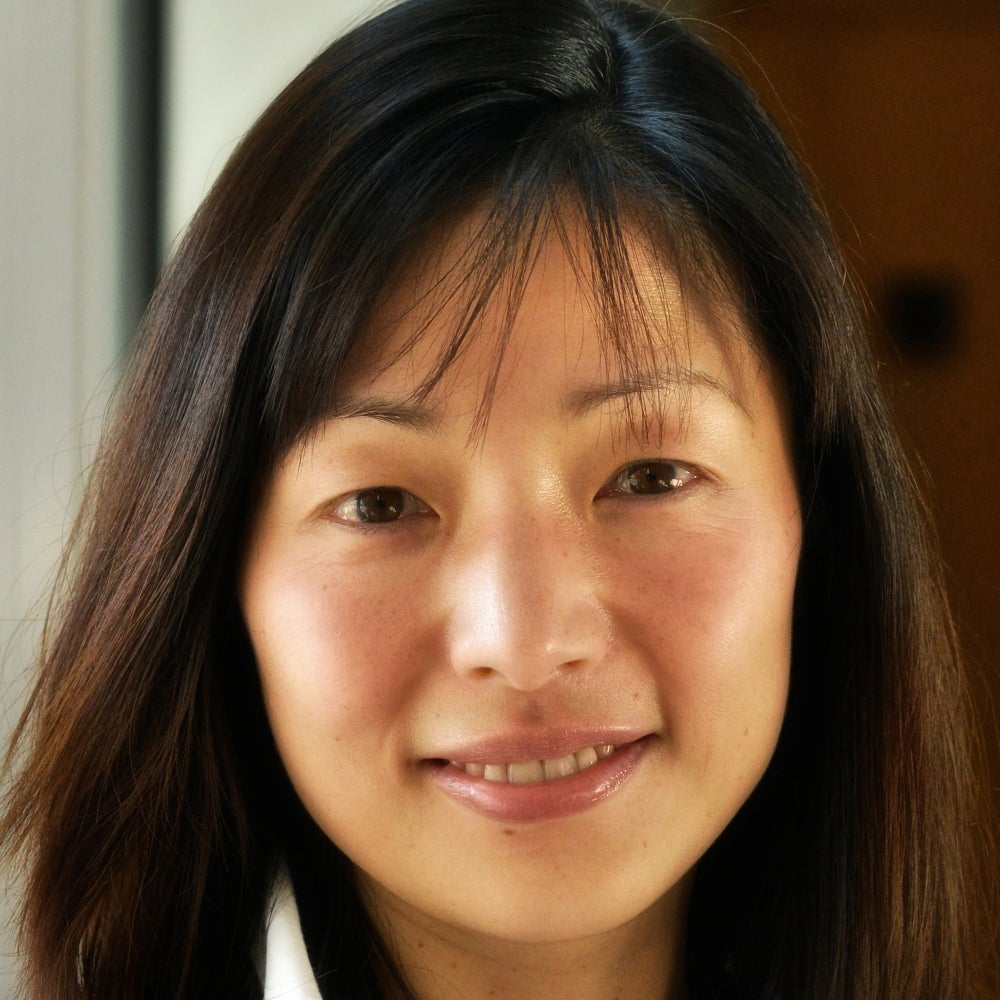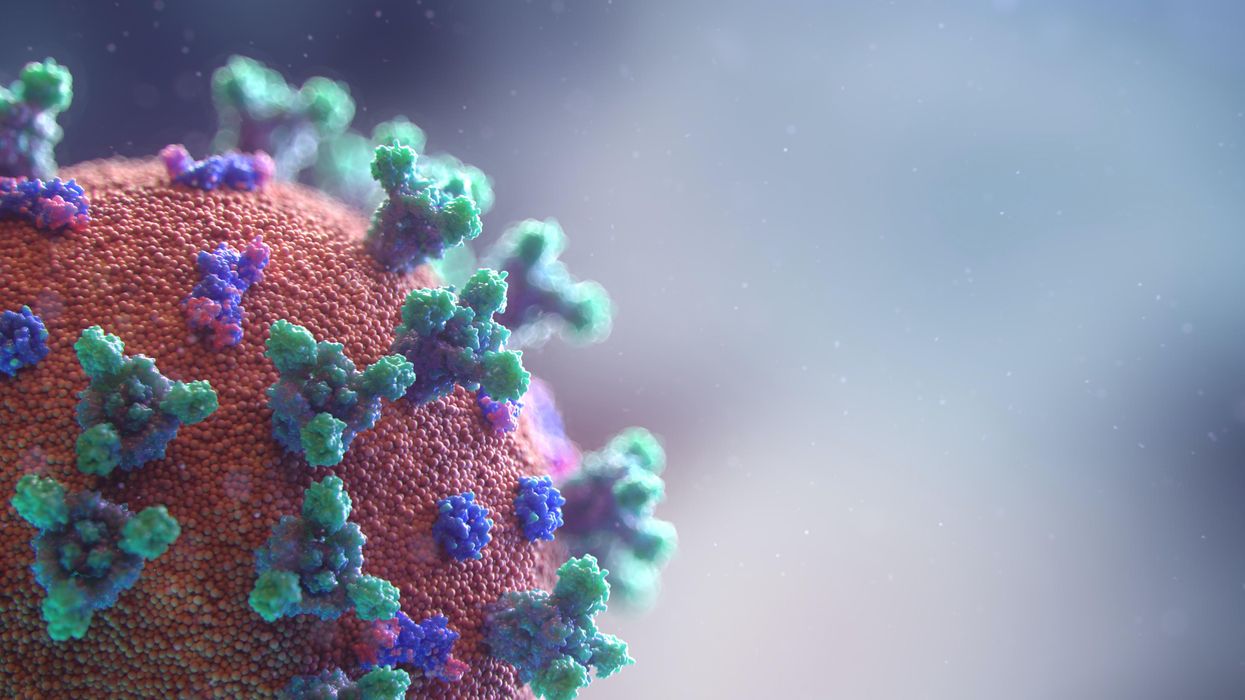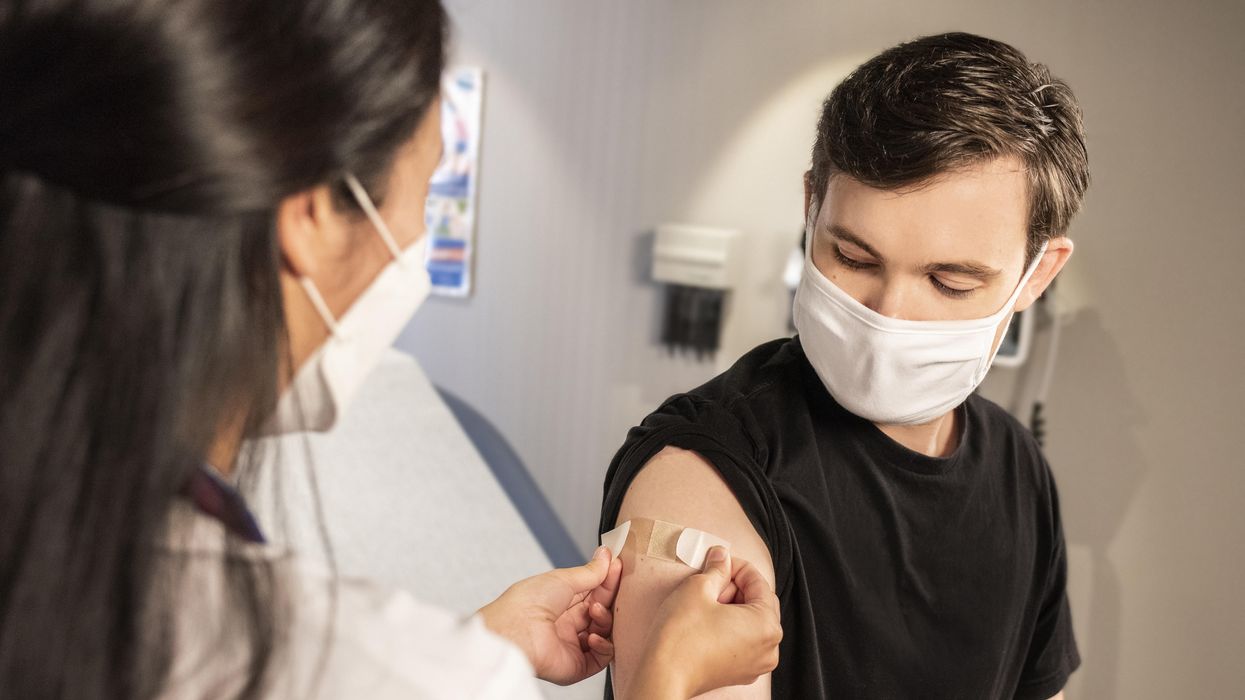Short Story Contest Winner: "The Gerry Program"

A father and son gaze at the ducks in a lake.
It's an odd sensation knowing you're going to die, but it was a feeling Gerry Ferguson had become relatively acquainted with over the past two years. What most perplexed the terminally ill, he observed, was not the concept of death so much as the continuation of all other life.
Gerry's secret project had been in the works for two years now, ever since they found the growth.
Who will mourn me when I'm gone? What trait or idiosyncrasy will people most recall? Will I still be talked of, 100 years from now?
But Gerry didn't worry about these questions. He was comfortable that his legacy would live on, in one form or another. From his cozy flat in the west end of Glasgow, Gerry had managed to put his affairs in order and still find time for small joys.
Feeding the geese in summer at the park just down from his house, reading classics from the teeming bookcase in the living room, talking with his son Michael on Skype. It was Michael who had first suggested reading some of the new works of non-fiction that now littered the large oak desk in Gerry's study.
He was just finishing 'The Master Algorithm' when his shabby grandfather clock chimed six o'clock. Time to call Michael. Crammed into his tiny study, Gerry pulled his computer's webcam close and waved at Michael's smiling face.
"Hi Dad! How're you today?"
"I'm alright, son. How're things in sunny Australia?"
"Hot as always. How's things in Scotland?"
"I'd 'ave more chance gettin' a tan from this computer screen than I do goin' out there."
Michael chuckled. He's got that hearty Ferguson laugh, Gerry thought.
"How's the project coming along?" Michael asked. "Am I going to see it one of these days?"
"Of course," grinned Gerry, "I designed it for you."
Gerry's secret project had been in the works for two years now, ever since they found the growth. He had decided it was better not to tell Michael. He would only worry.
The two men chatted for hours. They discussed Michael's love life (or lack thereof), memories of days walking in the park, and their shared passion, the unending woes of Rangers Football Club. It wasn't until Michael said his goodbyes that Gerry noticed he'd been sitting in the dark for the best part of three hours, his mesh curtains casting a dim orange glow across the room from the street light outside. Time to get back to work.
*
Every night, Gerry sat at his computer, crawling forums, nourishing his project, feeding his knowledge and debating with other programmers. Even at age 82, Gerry knew more than most about algorithms. Never wanting to feel old, and with all the kids so adept at this digital stuff, Gerry figured he should give the Internet a try too. Besides, it kept his brain active and restored some of the sociability he'd lost in the previous decades as old friends passed away and the physical scope of his world contracted.
This night, like every night, Gerry worked away into the wee hours. His back would ache come morning, but this was the only time he truly felt alive these days. From his snug red brick home in Scotland, Gerry could share thoughts and information with strangers from all over the world. It truly was a miracle of modern science!
*
The next day, Gerry woke to the warm amber sun seeping in between a crack in the curtains. Like every morning, his thoughts took a little time to come into focus. Instinctively his hand went to the other side of the bed. Nobody there. Of course; she was gone. Rita, the sweetest woman he'd ever known. Four years this spring, God rest her soul.
Puttering around the cramped kitchen, Gerry heard a knock at the door. Who could that be? He could see two women standing in the hallway, their bodies contorted in the fisheye glass of the peephole. One looked familiar, but Gerry couldn't be sure. He fiddled with the locks and pulled the door open.
"Hi Gerry. How are you today?"
"Fine, thanks," he muttered, still searching his mind for where he'd seen her face before.
Noting the confusion in his eyes, the woman proffered a hand. "Alice, Alice Corgan. I pop round every now and again to check on you."
It clicked. "Ah aye! Come in, come in. Lemme get ya a cuppa." Gerry turned and shuffled into the flat.
As Gerry set about his tiny kitchen, Alice called from the living room, "This is Mandy. She's a care worker too. She's going to pay you occasional visits if that's alright with you."
Gerry poked his head around the doorway. "I'll always welcome a beautiful young lady in ma home. Though, I've tae warn you I'm a married man, so no funny business." He winked and ducked back into the kitchen.
Alice turned to Mandy with a grin. "He's a good man, our Gerry. You'll get along just fine." She lowered her voice. "As I said, with the Alzheimer's, he has to be reminded to take his medication, but he's still mostly self-sufficient. We installed a medi-bot to remind him every day and dispense the pills. If he doesn't respond, we'll get a message to send someone over."
Mandy nodded and scribbled notes in a pad.
"When I'm gone, Michael will have somethin' to remember me by."
"Also, and this is something we've been working on for a few months now, Gerry is convinced he has something…" her voice trailed off. "He thinks he has cancer. Now, while the Alzheimer's may affect his day-to-day life, it's not at a stage where he needs to be taken into care. The last time we went for a checkup, the doctor couldn't find any sign of cancer. I think it stems from--"
Gerry shouted from the other room: "Does the young lady take sugar?"
"No, I'm fine thanks," Mandy called back.
"Of course you don't," smiled Gerry. "Young lady like yersel' is sweet enough."
*
The following week, Mandy arrived early at Gerry's. He looked unsure at first, but he invited her in.
Sitting on the sofa nurturing a cup of tea, Alice tried to keep things light. "So what do you do in your spare time, Gerry?"
"I've got nothing but spare time these days, even if it's running a little low."
"Do you have any hobbies?"
"Yes actually." Gerry smiled. "I'm makin' a computer program."
Alice was taken aback. She knew very little about computers herself. "What's the program for?" she asked.
"Well, despite ma appearance, I'm no spring chicken. I know I don't have much time left. Ma son, he lives down in Australia now, he worked on a computer program that uses AI - that's artificial intelligence - to imitate a person."
Alice still looked confused, so Gerry pressed on.
"Well, I know I've not long left, so I've been usin' this open source code to make ma own for when I'm gone. I've already written all the code. Now I just have to add the things that make it seem like me. I can upload audio, text, even videos of masel'. That way, when I'm gone, Michael will have somethin' to remember me by."
Mandy sat there, stunned. She had no idea anybody could do this, much less an octogenarian from his small, ramshackle flat in Glasgow.
"That's amazing Gerry. I'd love to see the real thing when you're done."
"O' course. I mean, it'll take time. There's so much to add, but I'll be happy to give a demonstration."
Mandy sat there and cradled her mug. Imagine, she thought, being able to preserve yourself, or at least some basic caricature of yourself, forever.
*
As the weeks went on, Gerry slowly added new shades to his coded double. Mandy would leaf through the dusty photo albums on Gerry's bookcase, pointing to photos and asking for the story behind each one. Gerry couldn't always remember but, when he could, the accompanying stories were often hilarious, incredible, and usually a little of both. As he vividly recounted tales of bombing missions over Burma, trips to the beach with a young Michael and, in one particularly interesting story, giving the finger to Margaret Thatcher, Mandy would diligently record them through a Dictaphone to be uploaded to the program.
Gerry loved the company, particularly when he could regale the young woman with tales of his son Michael. One day, as they sat on the sofa flicking through a box of trinkets from his days as a travelling salesman, Mandy asked why he didn't have a smartphone.
He shrugged. "If I'm out 'n about then I want to see the world, not some 2D version of it. Besides, there's nothin' on there for me."
Alice explained that you could get Skype on a smartphone: "You'd be able to talk with Michael and feed the geese at the park at the same time," she offered.
Gerry seemed interested but didn't mention it again.
"Only thing I'm worried about with ma computer," he remarked, "is if there's another power cut and I can't call Michael. There's been a few this year from the snow 'n I hate not bein' able to reach him."
"Well, if you ever want to use the Skype app on my phone to call him you're welcome," said Mandy. "After all, you just need to add him to my contacts."
Gerry was flattered. "That's a relief, knowing I won't miss out on calling Michael if the computer goes bust."
*
Then, in early spring, just as the first green buds burst forth from the bare branches, Gerry asked Mandy to come by. "Bring that Alice girl if ya can - I know she's excited to see this too."
The next day, Mandy and Alice dutifully filed into the cramped study and sat down on rickety wooden chairs brought from the living room for this special occasion.
An image of Gerry, somewhat younger than the man himself, flashed up on the screen.
With a dramatic throat clearing, Gerry opened the program on his computer. An image of Gerry, somewhat younger than the man himself, flashed up on the screen.
The room was silent.
"Hiya Michael!" AI Gerry blurted. The real Gerry looked flustered and clicked around the screen. "I forgot to put the facial recognition on. Michael's just the go-to name when it doesn't recognize a face." His voice lilted with anxious excitement. "This is Alice," Gerry said proudly to the camera, pointing at Alice, "and this is Mandy."
AI Gerry didn't take his eyes from real Gerry, but grinned. "Hello, Alice. Hiya Mandy." The voice was definitely his, even if the flow of speech was slightly disjointed.
"Hi," Alice and Mandy stuttered.
Gerry beamed at both of them. His eyes flitted between the girls and the screen, perhaps nervous that his digital counterpart wasn't as polished as they'd been expecting.
"You can ask him almost anything. He's not as advanced as the ones they're making in the big studios, but I think Michael will like him."
Alice and Mandy gathered closer to the monitor. A mute Gerry grinned back from the screen. Sitting in his wooden chair, the real Gerry turned to his AI twin and began chattering away: "So, what do you think o' the place? Not bad eh?"
"Oh aye, like what you've done wi' it," said AI Gerry.
"Gerry," Alice cut in. "What did you say about Michael there?"
"Ah, I made this for him. After all, it's the kind o' thing his studio was doin'. I had to clear some space to upload it 'n show you guys, so I had to remove Skype for now, but Michael won't mind. Anyway, Mandy's gonna let me Skype him from her phone."
Mandy pulled her phone out and smiled. "Aye, he'll be able to chat with two Gerry's."
Alice grabbed Mandy by the arm: "What did you tell him?" she whispered, her eyes wide.
"I told him he can use my phone if he wants to Skype Michael. Is that okay?"
Alice turned to Gerry, who was chattering away with his computerized clone. "Gerry, we'll just be one second, I need to discuss something with Mandy."
"Righto," he nodded.
Outside the room, Alice paced up and down the narrow hallway.
Mandy could see how flustered she was. "What's wrong? Don't you like the chatbot? I think it's kinda c-"
"Michael's dead," Alice spluttered.
"What do you mean? He talks to him all the time."
Alice sighed. "He doesn't talk to Michael. See, a few years back, Michael found out he had cancer. He worked for this company that did AI chatbot stuff. When he knew he was dying he--" she groped in the air for the words-- "he built this chatbot thing for Gerry, some kind of super-advanced AI. Gerry had just been diagnosed with Alzheimer's and I guess Michael was worried Gerry would forget him. He designed the chatbot to say he was in Australia to explain why he couldn't visit."
"That's awful," Mandy granted, "but I don't get what the problem is. I mean, surely he can show the AI Michael his own chatbot?"
"No, because you can't get the AI Michael on Skype. Michael just designed the program to look like Skype."
"But then--" Mandy went silent.
"Michael uploaded the entire AI to Gerry's computer before his death. Gerry didn't delete Skype. He deleted the AI Michael."
"So… that's it? He-he's gone?" Mandy's voice cracked. "He can't just be gone, surely he can't?"
The women stood staring at each other. They looked to the door of the study. They could still hear Gerry, gabbing away with his cybercopy.
"I can't go back in there," muttered Mandy. Her voice wavered as she tried to stem the misery rising in her throat.
Alice shook her head and paced the floor. She stopped and stared at Mandy with grim resignation. "We don't have a choice."
When they returned, Gerry was still happily chatting away.
"Hiya girls. Ya wanna ask my handsome twin any other questions? If not, we could get Michael on the phone?"
Neither woman spoke. Gerry clapped his hands and turned gaily to the monitor again: "I cannae wait for ya t'meet him, Gerry. He's gonna be impressed wi' you."
Alice clasped her hands to her mouth. Tears welled in the women's eyes as they watched the old man converse with his digital copy. The heat of the room seemed to swell, becoming insufferable. Mandy couldn't take it anymore. She jumped up, bolted to the door and collapsed against a wall in the hallway. Alice perched on the edge of her seat in a dumb daze, praying for the floor to open and swallow the contents of the room whole.
Oblivious, Gerry and his echo babbled away, the blue glow of the screen illuminating his euphoric face. "Just wait until y'meet him Gerry, just wait."
Sept. 13th Event: Delta, Vaccines, and Breakthrough Infections
A visualization of the virus that causes COVID-19.
This virtual event will convene leading scientific and medical experts to address the public's questions and concerns about COVID-19 vaccines, Delta, and breakthrough infections. Audience Q&A will follow the panel discussion. Your questions can be submitted in advance at the registration link.
DATE:
Monday, September 13th, 2021
12:30 p.m. - 1:45 p.m. EDT
REGISTER:

Dr. Amesh Adalja, M.D., FIDSA, Senior Scholar, Johns Hopkins Center for Health Security; Adjunct Assistant Professor, Johns Hopkins Bloomberg School of Public Health; Affiliate of the Johns Hopkins Center for Global Health. His work is focused on emerging infectious disease, pandemic preparedness, and biosecurity.

Dr. Nahid Bhadelia, M.D., MALD, Founding Director, Boston University Center for Emerging Infectious Diseases Policy and Research (CEID); Associate Director, National Emerging Infectious Diseases Laboratories (NEIDL), Boston University; Associate Professor, Section of Infectious Diseases, Boston University School of Medicine. She is an internationally recognized leader in highly communicable and emerging infectious diseases (EIDs) with clinical, field, academic, and policy experience in pandemic preparedness.

Dr. Akiko Iwasaki, Ph.D., Waldemar Von Zedtwitz Professor of Immunobiology and Molecular, Cellular and Developmental Biology and Professor of Epidemiology (Microbial Diseases), Yale School of Medicine; Investigator, Howard Hughes Medical Institute. Her laboratory researches how innate recognition of viral infections lead to the generation of adaptive immunity, and how adaptive immunity mediates protection against subsequent viral challenge.
 Dr. Marion Pepper, Ph.D., Associate Professor, Department of Immunology, University of Washington. Her lab studies how cells of the adaptive immune system, called CD4+ T cells and B cells, form immunological memory by visualizing their differentiation, retention, and function.
Dr. Marion Pepper, Ph.D., Associate Professor, Department of Immunology, University of Washington. Her lab studies how cells of the adaptive immune system, called CD4+ T cells and B cells, form immunological memory by visualizing their differentiation, retention, and function.
This event is the third of a four-part series co-hosted by Leaps.org, the Aspen Institute Science & Society Program, and the Sabin–Aspen Vaccine Science & Policy Group, with generous support from the Gordon and Betty Moore Foundation and the Howard Hughes Medical Institute.
Kira Peikoff was the editor-in-chief of Leaps.org from 2017 to 2021. As a journalist, her work has appeared in The New York Times, Newsweek, Nautilus, Popular Mechanics, The New York Academy of Sciences, and other outlets. She is also the author of four suspense novels that explore controversial issues arising from scientific innovation: Living Proof, No Time to Die, Die Again Tomorrow, and Mother Knows Best. Peikoff holds a B.A. in Journalism from New York University and an M.S. in Bioethics from Columbia University. She lives in New Jersey with her husband and two young sons. Follow her on Twitter @KiraPeikoff.
Don't Panic Over Waning Antibodies. Here's Why.
A health care worker places a bandaid on the arm of a man who has just been vaccinated.
Since the Delta variant became predominant in the United States on July 7, both scientists and the media alike have been full of mixed messages ("breakthrough infections rare"; "breakthrough infections common"; "vaccines still work"; "vaccines losing their effectiveness") but – if we remember our infectious diseases history- one thing remains clear: immunity is the only way to get through a pandemic.
What Happened in the Past
The 1918 influenza pandemic was far the deadliest respiratory virus pandemic recorded in recent human history with over 50 million deaths (maybe even 100 million deaths, or 3% of the world's population) worldwide. Although they used some of the same measures we are using now (masks, distancing, event closures, as neither testing nor a vaccine existed back then), the deaths slowed only after enough of the population had either acquired immunity through natural infection or died. Indeed, the first influenza vaccine was not developed until 1942, more than 20 years later. As judged by the amount of suffering and death from 1918 influenza (and the deadly Delta surge in India in spring 2021), natural immunity is obviously a terrible way to get through a pandemic.
Similarly, measles was a highly transmissible respiratory virus that led to high levels of immunity among adults who were invariably exposed as children. However, measles led to deaths each year among the nonimmune until a vaccine was developed in 1963, largely restricting current measles outbreaks in the U.S. now to populations who decline to vaccinate. Smallpox also led to high levels of immunity through natural infection, which was often fatal. That's why unleashing smallpox on a largely nonimmune population in the New World was so deadly. Only an effective vaccine – and its administration worldwide, including among populations who declined smallpox vaccine at first via mandates – could control and then eventually eradicate smallpox from Earth.
Fully vaccinated people are already now able to generate some antibodies against all the variants we know of to date, thanks to their bank of memory B cells.
The Delta variant is extremely transmissible, making it unlikely we will ever eliminate or eradicate SARS-CoV-2. Even Australia, which had tried to maintain a COVID-zero nation with masks, distancing, lockdowns, testing and contact tracing before and during the vaccines, ended a strategy aimed at eliminating COVID-19 this week. But, luckily, since highly effective and safe vaccines were developed for COVID-19 less than a year after its advent on a nonimmune population and since vaccines are retaining their effectiveness against severe disease, we have a safe way out of the misery of this pandemic: more and more immunity. "Defanging" SARS-CoV-2 and stripping it of its ability to cause severe disease through immunity will relegate it to the fate of the other four circulating cold-causing coronaviruses, an inconvenience but not a world-stopper.
Immunity Is More Than Antibodies
When we say immunity, we have to be clear that we are talking about cellular immunity and immune memory, not only antibodies. This is a key point. Neutralizing antibodies, which prevent the virus from entering our cells, are generated by the vaccines. But those antibodies will necessarily wane over time since we cannot keep antibodies from every infection and vaccine we have ever seen in the bloodstream (or our blood would be thick as paste!). Vaccines with shorter intervals between doses (like Pfizer vaccines given 3 weeks apart) are likely to have their antibodies wane sooner than vaccines with longer intervals between doses (like Moderna), making mild symptomatic breakthroughs less likely with the Moderna vaccine than the Pfizer during our Delta surge, as a recent Mayo Clinic study showed.
Luckily, the vaccines generate B cells that get relegated to our memory banks and these memory B cells are able to produce high levels of antibodies to fight the virus if they see it again. Amazingly, these memory B cells will actually produce antibodies adapted against the COVID variants if they see a variant in the future, rather than the original antibodies directed against the ancestral strain. This is because memory B cells serve as a blueprint to make antibodies, like the blueprint of a house. If a house needs an extra column (or antibodies need to evolve to work against variants), the blueprint will oblige just as memory B cells will!
One problem with giving a 3rd dose of our current vaccines is that those antibodies won't be adapted towards the variants. Fully vaccinated people are already now able to generate some antibodies against all the variants we know of to date, thanks to their bank of memory B cells. In other words, no variant has evolved to date that completely evades our vaccines. Memory B cells, once generated by either natural infection or vaccination, should be long-lasting.
If memory B cells are formed by a vaccine, they should be as long-lasting as those from natural infection per various human studies. A 2008 Nature study found that survivors of the 1918 influenza pandemic were able to produce antibodies from memory B cells when exposed to the same influenza strain nine decades later. Of note, mild infections (such as the common cold from the cold-causing coronaviruses called 229E, NL63, OC43, and HKU1) may not reliably produce memory B cell immunity like more severe infections caused by SARS-CoV-2.
Right about now, you may be worrying about a super-variant that might yet emerge to evade all our hard-won immune responses. But most immunologists do not think this is very realistic because of T cells. How are T cells different from B Cells? While B cells are like the memory banks to produce antibodies when needed (helped by T cells), T cells will specifically amplify in response to a piece of the virus and help recruit cells to attack the pathogen directly. We likely have T cells to thank for the vaccine's incredible durability in protecting us against severe disease. Data from La Jolla Immunology Institute and UCSF show that the T cell response from the Pfizer vaccine is strong across all the variants.
Think of your spike protein as being comprised of 100 houses with a T cell there to cover each house (to protect you against severe disease). The variants have around 13 mutations along the spike protein so 13 of those T cells won't work, but there are over 80 T cells remaining to protect your "houses" or your body against severe disease.
Although these are theoretical numbers and we don't know exactly the number of T cell antigens (or "epitopes") across the spike protein, one review showed 1400 across the whole virus, with many of those in the spike protein. Another study showed that there were 87 epitopes across the spike protein to which T cells respond, and mutations in one of the variants (beta) took those down to 75. The virus cannot mutate indefinitely in its spike protein and still retain function. This is why it is unlikely we will get a variant that will evade the in-breadth, robust response of our T cells.
Where We Go From Here
So, what does this mean for getting through this pandemic? Immunity and more immunity. For those of us who are vaccinated, if we get exposed to the Delta variant, it will boost our immune response although the memory B cells might take 3-5 days to make new antibodies, which can leave us susceptible to a mild breakthrough infection. That's part of the reason the CDC put back masks for the vaccinated in late July. For those who are unvaccinated, immunity will be gained from Delta but often through terrible ways like severe disease.
The way for the U.S. to determine the need for 3rd shots among those who are not obviously immunocompromised, given the amazing immune memory generated by the vaccines among immunocompetent individuals, is to analyze the cases of the ~6000 individuals who have had severe breakthrough infections among the 171 million Americans fully vaccinated. Define their co-morbidities and age ranges, and boost those susceptible to severe infections (examples could include older people, those with co-morbidities, health care workers, and residents of long-term care facilities). This is an approach likely to be taken by the CDC's Advisory Committee on Immunization Practices.
If immunity is the only way to get through the pandemic and if variants are caused mostly by large populations being unvaccinated, there is not only a moral and ethical imperative but a practical imperative to vaccinate the world in order to keep us all safe. Immunocompetent Americans can boost their antibodies, which may enhance their ability to avoid mild breakthrough infections, but the initial shots still work well against the most important outcomes: hospitalizations and deaths.
There has been no randomized, controlled trial to assess whether three shots vs. two shots meaningfully improve those outcomes. While we ought to trust immune memory to get the immunocompetent in the United States through, we can hasten the end of this pandemic by providing surplus vaccines to poor countries to combat severe disease. Doing so would not only revitalize the role of the U.S. as a global health leader – it would save countless lives.

